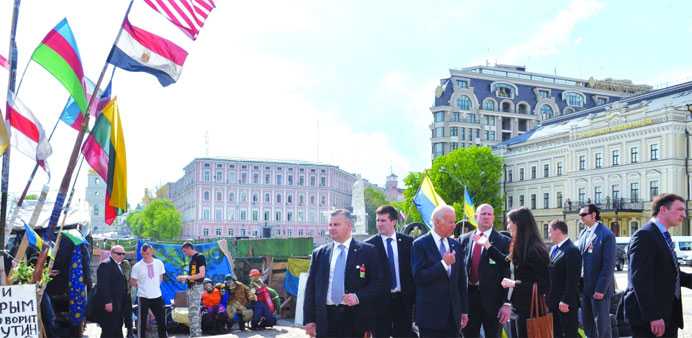Biden at one of barricades in Kiev’s ‘Maidan’ yesterday. Biden has accused Russia of ‘trying to pull Ukraine apart’.
AFP/Kiev
US Vice-President Joe Biden has said that the United States stood by Ukraine's new pro-Western leaders in the face of "humiliating threats" as Washington and Moscow traded blame over the crisis in the ex-Soviet country.
"You face very daunting problems, and some might say, humiliating threats," Biden told a group of lawmakers in a meeting at Ukraine's parliament.
The US would "stand with" Ukraine ahead of a presidential poll scheduled for May 25 that "may be the most important election in Ukrainian history", he said.
Biden's symbolic two-day visit to Kiev came as US officials said that the onus was firmly on Moscow to fulfil an accord struck last week aimed at reducing tensions in the worst East-West confrontation since the Cold War.
Under the deal signed by Ukraine, Russia, the United States and the European Union in Geneva, all militias in the country were supposed to disarm and give up control over seized state property.
Washington and Kiev have put the onus on pro-Kremlin militants holding buildings in the east, while Moscow said the responsibility fell to pro-Western nationalists camping out in Kiev.
The split over Ukraine was on display in a crunch phone call between American and Russian diplomatic chiefs, with each side putting a radically different spin on the conversation aimed at reviving the Geneva accord.
US Secretary of State John Kerry called on Moscow to put pressure on the pro-Russian separatists, which Washington sees as backed by the Kremlin.
But Russian Foreign Minister Sergei Lavrov urged Washington to influence the Ukrainian government, which Moscow accuses of "grossly breaching" the Geneva deal.
Kerry told Lavrov that "concrete steps" to defuse the crisis should include "publicly calling on separatists to vacate illegal buildings and checkpoints, accept amnesty and address their grievances politically", said State Department spokeswoman Jen Psaki.
US Ambassador to Kiev Geoffrey Pyatt told journalists on Monday that "the ball is really in Moscow's court" over making the agreement work and said Washington would take "days not weeks" to assess the implementation of the accord.
In Moscow, the foreign ministry said Lavrov had asked Kerry to "pressure Kiev to stop hotheads from provoking a bloody conflict and to encourage the Ukrainian authorities to strictly fulfil their obligations".
Lavrov also accused Ukraine's government of an "inability and unwillingness" to rein in Pravy Sektor ("Right Sector"), an ultra-nationalist group the separatists blamed for a deadly attack on Sunday on one of their checkpoints near the flashpoint town of Slaviansk.
Funerals of at least two pro-Moscow rebels killed in the gunbattle were set to take place in the town yesterday in an emotive ceremony that could stoke additional anger in the east.
US President Barack Obama has threatened more sanctions on Moscow if the Geneva accord is not implemented soon, beyond those already imposed by the United States and the European Union.
White House press secretary Jay Carney said on Monday that Washington was ready to make good on its threat, warning that "if progress is not made in coming days we will impose further costs".
Russian Prime Minister Dmitry Medvedev said yesterday that Russia was ready to face a new round of sanctions.
"I am sure we will be able to minimise their consequences," Medvedev said in a televised speech to parliament.
Russia, which annexed Ukraine's Crimea peninsula last month after sending in troops, has massed a military force estimated at 40,000 soldiers on Ukraine's eastern border.
The United States and Nato have responded by boosting their own forces in eastern Europe.
But Obama's preferred weapon is sanctions, which have included travel bans and freezing assets of close Putin allies.
The EU is divided on going further, with some member states worried that increased punishment could jeopardise supplies of Russian gas.
Across Ukraine's east, the insurgents remained firmly entrenched in public buildings they have occupied for more than a week.
In a sign that they are in no mood to back down, an AFP journalist reported from the town of Kramatorsk yesterday that separatist gunmen had moved in overnight to surround the local police station.
Elsewhere, in the town of Lugansk, close to the Russian border, protesters who have been occupying local security buildings staged a fiery mass demonstration on Monday and pledged to hold a referendum on autonomy on May 11, Interfax-Ukraine news agency reported.
Although highly-trained military personnel whose camouflage uniforms are stripped of all insignia have been seen helping the rebels secure the some 10 towns they hold, Russian President Vladimir Putin denies they are Russian special forces – a stance echoed by the self-declared mayor of rebel-held Slaviansk.
"There is not a single representative of the Russian armed forces here. Nor of the state structures of Russia," said Vyacheslav Ponomaryov, blaming the Ukrainian authorities for the hostilities.
"If they had not come to us we wouldn't need any weapons. We are defending ourselves," he told AFP.
However, the US State Department released images on Monday that it claimed proves armed separatists in eastern Ukraine are actually Russian military or intelligence officers.

